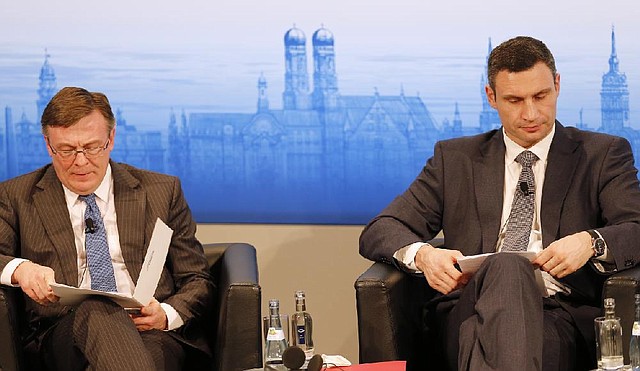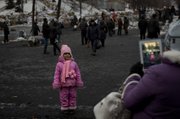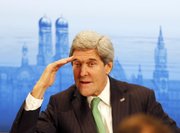Russians fault West in Ukraine’s troubles
Ukrainian Foreign Minister Leonid Kozhara (left) and opposition leader Vitali Klitschko attend the Munich Security Conference on Saturday.
Sunday, February 2, 2014
MUNICH - The Russian government accused the West of helping foment unrest in Ukraine as the country’s opposition leaders sought outside help at a conference in Germany and vowed to continue anti-government protests.
Ukraine has faced two months of protests that started after President Viktor Yanukovych backed off an agreement to deepen ties with the European Union in favor of relations with Moscow.
The demonstrations had been mostly peaceful until mid-January, when demonstrators angered by new anti-protest laws engaged in violent clashes with police. Three protesters died in the clashes, two of them from gunshots. Police insist they didn’t fire the fatal shots.
At a gathering of the world’s top diplomats and defense officials in Munich, Russian Foreign Minister Sergey Lavrov took issue with what he said were “prominent European politicians actually encouraging such actions.”
“What does incitement of increasingly violent street protests have to do with promoting democracy?” Lavrov said. “Why don’t we hear condemnations of those who seize and hold government buildings, burn, torch the police, use racist and anti-Semitic and Nazi slogans?”
NATO Secretary-General Anders Fogh Rasmussen blamed security forces in Ukraine for using excessive force, and added that “Ukraine must have the freedom to choose its own path without external pressure.”
One of Ukraine’s top opposition leaders, Arseniy Yatsenyuk, said his country needs more than “vocal support” from the West.
Yatsenyuk, along with fellow opposition politicians Vitali Klitschko and Petro Poroshenko, met U.S. Secretary of State John Kerry on the sidelines of the Munich Security Conference. The State Department said Kerry encouraged the opposition to remain united and peaceful and keep talking with the government.
Kerry also called on Ukrainian Foreign Minister Leonid Kozhara for the government to take steps such as the release of prisoners and the formation of a “technical government” that can address the country’s economic problems, the department said.
Klitschko left the conference briefly to address several hundred supporters at a demonstration about a halfmile away.
“We want to be a modern European country, live with a secure future,” Klitschko, a former heavyweight boxing champion, told the crowd. “Without a fight, there’s no victory. Therefore, we must fight.”
Klitschko reiterated the opposition’s demands, including freeing political prisoners, overhauling the constitution and paving the way for early elections.
Appearing later at a panel discussion alongside Klitschko, Kozhara pushed back against criticism of his government. Kozhara said Yanukovych had met the demands of the protesters and renewed calls for talks. He said demonstrators didn’t represent the interests of all Ukrainians, citing the eight million ethnic Russians among Ukraine’s 45 million people.
“We think we have met all major demands from the opposition, but today is the time that the opposition shares also responsibility,” he said. He added that “when the police [are] attacked with Molotov cocktails, this is not a peaceful protest; if ministries and the … city mayor’s office [are]occupied, that’s also not a peaceful protest.”
“Ukraine is not going to change her strategic course,” Kozhara told the panel.
Kerry said at the conference that the crisis in Ukraine is about ordinary people fighting for the right to associate with the EU. He said Ukrainians have decided their futures don’t have to be tied with just one country - an allusion to Russia.
“Nowhere is the fight for a democratic, European future more important today than in Ukraine,” he said. “While there are unsavory elements in any chaotic situation, the vast majority of Ukrainians want to live freely in a safe, prosperous country.”
Kerry said the U.S. and EU “stand with the people of Ukraine in that fight.”
Kerry did not directly criticize Russia, but he said “Russia and other countries” should not view the European integration of their neighbors as a process that hurts them.
“In fact, the lesson of the last half-century is that we can accomplish much more when the United States, Russia and Europe work together. But make no mistake: We will continue to speak out when our interests or values are undercut by any country in the region,” Kerry said.
Kerry made his remarks alongside U.S. Defense Secretary Chuck Hagel, who did not directly mention Ukraine.
Hagel did echo Kerry’s call for a “trans-Atlantic renaissance,” or redoubling of efforts to improve all manner of cooperation between the United States and its European allies in NATO.
Lavrov suggested that a possible solution to tensions such as those over Ukraine was a free-trade zone including the EU and a customs union of former Soviet states, floated in the past by Russian President Vladimir Putin.
“It is unlikely that any European nation would face the ‘either-or’ choice today if we were already on the track to a common European home,” he said. “Unfortunately, what still prevails is the logic of preserving the dividing lines according to the principle of ‘he who is not for us is against us.’”
Rasmussen scoffed at that suggestion later, telling reporters that Russia used “both sticks and carrots to get their immediate neighbors to join” a customs union and other trade agreements in the past.
Nations “are queuing up to become members of the EU and NATO not because we use sticks, but because we can offer economic opportunities and security cooperation,” he said.
Russia agreed to lend Ukraine $15 billion and reduce the price for natural-gas deliveries after Yanukovych rejected an EU integration pact in November. After buying $3 billion of Ukrainian bonds in December, Russia may withhold any further aid until a new Cabinet is formed, Putin said last week.
In Kiev, anti-government protesters captured and beat a plainclothes policeman in the part of the city controlled by demonstrators, authorities said Saturday.
While much attention has focused on the plight of protesters in the skirmishes and fighting in the streets during the civil unrest, the Interior Ministry, which controls the police, said dozens of law-enforcement officers also have suffered.
Protesters belonging to an organization called the Defense of Maidan, after the name of the central plaza they have occupied since November, detained the police officer and escorted him to a building under the control of the opposition, known as the Headquarters of the Resistance.
“They took the policeman’s badge, his personal belongings and also continued to strike him with multiple blows,” the ministry’s statement said. It also said that Yuri Levchenko, an official with the Svoboda political party, one of three opposition parties associated with the protests, had watched the beating without intervening.
The political opposition denied the entire account. Levchenko said he had been in a different building overnight from Friday to Saturday and that dozens of witnesses could confirm he had not presided over the beating of a policeman.
“This is an absolute lie,” he said, but one intended, he suggested, to balance reports Friday that an opposition leader, Dmytro Bulatov, had been tortured by having his hands nailed to a door, apparently by supporters of the government.
“They want to show they are not the only bad guys, that there are bad guys on the other side of the barricades, too,” Levchenko said.
Information for this article was contributed by David Rising, Geir Moulson, Robert Burns of The Associated Press; by Andrew E. Kramer of The New York Times; and by Patrick Donahue, Olga Tanas, Sangwon Yoona, Daryna Krasnolutska and Tony Czuczka of Bloomberg News.
Front Section, Pages 1 on 02/02/2014



